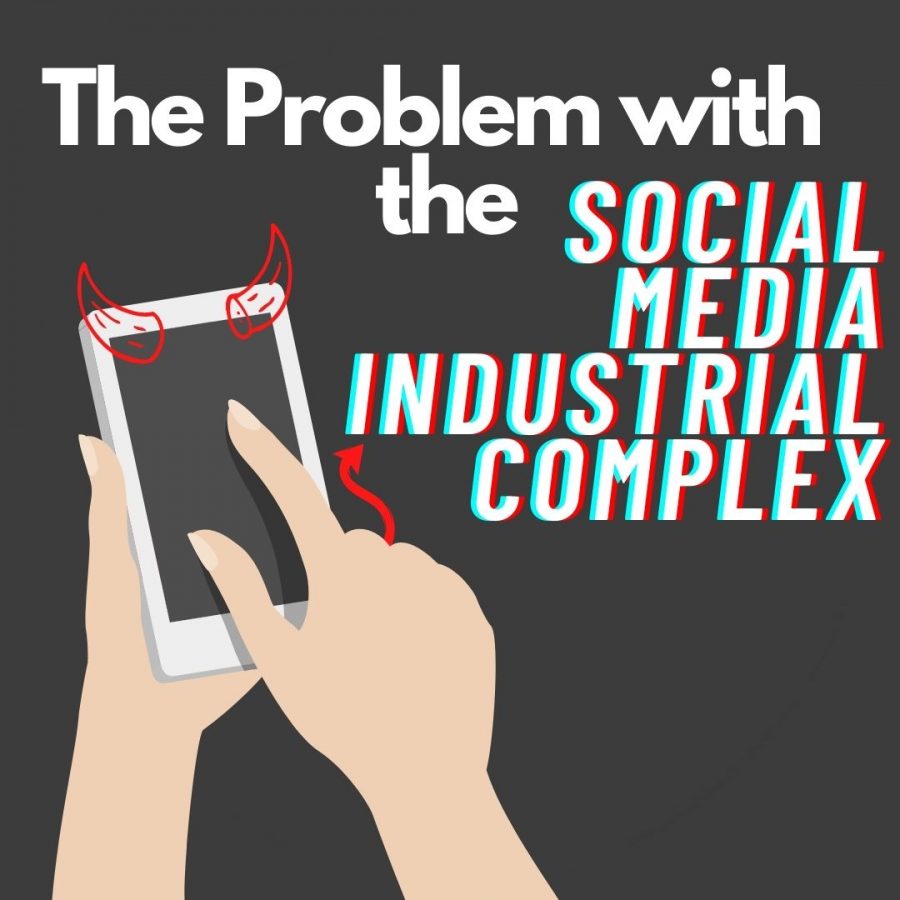The Problem With the Social Media Industrial Complex
November 18, 2021
If you are like most people, you check your phone first thing in the morning. You may text your friends, check your social media apps or spend time mindlessly scrolling through Tik Tok before getting out of bed. As of 2020, the average American spends 145 minutes on social media per day, primarily using social media as their main form of communication and outlet to the outside world. Social media outlets provide current news for the user and lets them understand the world around them. The “social media industrial complex” aims to make the user believe that social media is necessary for everyday life.
Cal Newport, who coined the term “social media industrial complex,” describes it as the combination of social media monopolies and the growing sector of the knowledge tech economy, which all depend on the belief that social media is imperative for daily living. The problem with this complex arises when social media begins to interfere with the user’s psyche.
The more someone uses social media, the worse their attention span becomes. Social media provides the user with information at their fingertips, with little to no effort; this eventually affects the brain’s episodic memory. When the social media industrial complex leads the user to believe that social media provides them with the most efficient and useful way to get the information they seek, the user depends on social media,further damaging the brain. This damage then hampers social skills, since the user is attached to their phone for both information and stimulation.
Psychologically, social media can affect the user’s self esteem, possibly causing depression and/or anxiety. Social media releases the “feel good” chemical— dopamine— in the brain. This release of dopamine drives the user to continue using social media, even if it makes the user depressed or anxious. When someone posts on social media, they do not know what to expect, but anxiously await a positive response through the form of likes or comments, causing the brain to then release dopamine as a reward. Users constantly check their notifications to know if people have responded positively or negatively to their content, comparing themselves to what others post as well. Social media has taught people to search for validation on their phones for the purpose of gaining dopamine.
Companies create their social media platforms in a way that causes the user to become addicted and dependent. When the user compares their amount of likes or comments to the amount of another user, their self esteem is affected. When the user receives a positive reaction, they continue posting in order to get the same reaction that made their self esteem go up. When the user receives a negative reaction, it is discouraging, causing one to use the platform more in order to gain as many likes as another user as a way of gaining validation… The user then becomes dependent on this feeling, regardless of the outcome.
Large companies in the social media industrial complex get users to use their platform by providing them with an outlet to the outside world, but they grow their company due to prolonged screen time on the platform. Someone using social media for fun and by choice does not create “the social media industrial complex:” the compulsive need to use social media that gives users no choice fuels the industry. In order to dismantle “the social media industrial complex,” a user who finds themselves compulsively checking social media for dopamine and stimulation must separate the necessary uses of social media: communicating with others and current news, with the unnecessary uses: prolonged scrolling through their feed and excessively checking the platform.








